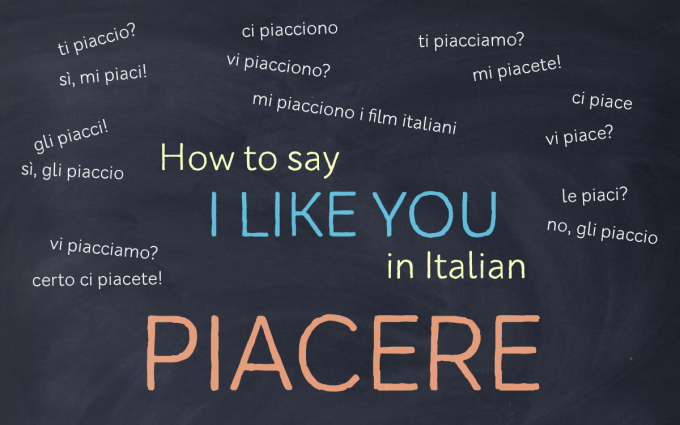Okay, so for speakers of English, this is a doozy. It seems like it should be simple. Why is it so hard? And it gets worse, too, because piacere is not the only verb that acts this way! So, let’s spend a little time understanding PIACERE.
If you’ve done your Pimsleur lessons you’ve heard again and again mi piace translated as I like. Even though this is what it means, it doesn’t literally translate this way which can make it difficult for beginning learners who are still forced to translate in their heads. If I had my way, it would be translated just a touch more literally when drilling. Yes, it will sound strange in English, but it works to get your head in understanding mode.
To express I like Italians really say something like it is pleasing to me. So, piacere, translated as literally as possible, is to be pleasing. When we say this in English it sounds a little funny, but it’s grammatically correct.
That book is pleasing to me.
Now, if I were to translate this literally to Italian, it might look like this:
Quel libro piace a me.
But of course Italians don’t talk like that. And that’s what makes this construction even more difficult for English speakers – the indirect pronoun comes first, right where the subject pronoun would be in English. In English the subject of the verb to like is the person doing the liking. We say I like you or I like it or I like that book. But in Italian the subject of the verb is the thing being liked just like it is in the English rendition to be pleasing. So if we were to translate literally from the Italian it would look like this:
mi piace
to me it is pleasing
mi = a me = to me
While you are getting used to this construction, try using a me instead of mi just to remind yourself that you are saying to me. This will help you remember how to conjugate piacere.
a me piace quel libro
to me it is pleasing that book
Now take that to the next level and say:
a te piace quel libro
to you it is pleasing that book
a noi piace quel libro
to us it is pleasing that book
And so on. Not too difficult, right? After all, piace stays the same. Well, here’s the tricky part. How do I say you like me or I like you? Uh oh.
Well, now you know that in Italian when you want to say you like me you really have to say I am pleasing to you or in the order we’d say it in Italian to you I am pleasing. In English it sounds a bit Yoda-ish, but this will help you, trust me.
So let’s start building our phrase with to you
a te = to you
Ok, so now you know what you must do with piacere, right? It must be conjugated for io.
Let’s do that.
piaccio
to you I am pleasing
a te piaccio
or with the more abbreviated form of the indirect pronoun:
ti piaccio
Try it out at home! Tell your spouse, friend, child, etc., that you like them or that they like you or that someone else likes them. Do this throughout the day until it starts to make sense to you.
Here’s a little dialogue to get you started:
LUI: Vedi quella ragazza lì? Perché mi guarda così?
LEI: Forse a lei piaci. Sì, le piaci.
LUI: No. Tu le piaci.
LEI: Credo di no. E poi se io le piacessi mi guarderebbe. Ma lei guarda te. Tu le piaci.
LUI: Sei gelosa?
LEI: Io? Tu non mi piaci.
LUI: Perché no?
LEI: Perché sei un secchione.*
LUI: Ma ti piacciono i secchioni.
LEI: Non è vero.
LUI: Tutti i suoi ragazzi sono stati secchioni.
LEI: La cosa importante e che tu piaci a lei. Dovresti parlarle.
LUI: E cosa le dico? Quella ragazza lì mi ha detto che io ti piaccio? Guarda, c’è un ragazzo vicino a lei e lui ti guarda. Gli piaci!
LEI: Come? No, non gli piaccio. Guarda, anche lui ti guarda. Probabilmente è geloso. Meglio che stai attento. Non gli piaci.
*secchione: over-achiever, brainiac, nerd
Grazie a Michele per aver controllato il dialogo!




3 Comments
Jennifer
August 15, 2016 - 11:41 amGreat post, Lisa. Please do another on “mancare”. That verb is much hard to use than piacere, IMO
Lisa
August 16, 2016 - 8:34 amHi Jennifer,
Yeah, I agree! I’ll see what I can do!